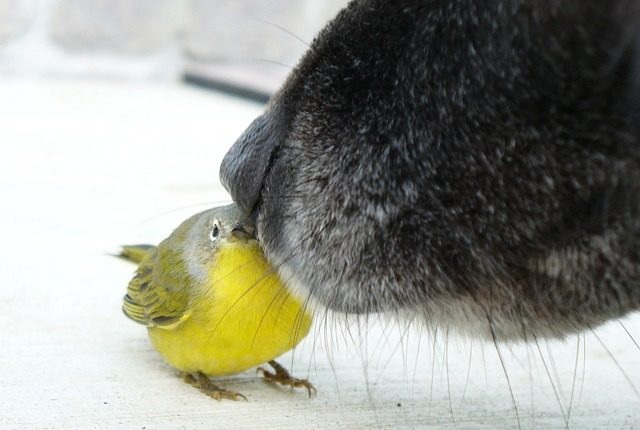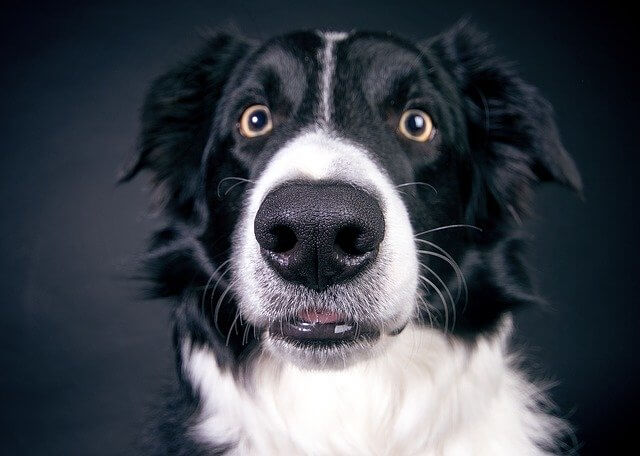Natural Moisturizers for Dog Noses
Without a moist, healthy nose, your dog cannot efficiently explore the neighborhood or recognize his favorite scent – you! Luckily, there are several safe, natural ingredients you can apply topically to help soothe and heal your pup’s dry nose. (Tip: if you need some help finding these ingredients, there are dozens of natural dog nose balms on Chewy or Amazon)
Humans often use shea butter to soften their own dry skin and it works just as well on crusty dog noses! It is completely pup-safe in small amounts and can also be used to soothe dry paws and elbows.
 Olive oil isn’t just for cooking! It can moisturize dry dog noses too!
Olive oil isn’t just for cooking! It can moisturize dry dog noses too!
Almost every kitchen has a bottle of olive oil for cooking, but this household favorite can also be used on dry noses, paws, and ears. You can even add a teaspoon to your dog’s meals to promote healthy skin from the inside out.
Castor oil is comprised of 90% Ricinoleic acid which provides powerful healing properties for dry, irritated skin. Just remember, a little goes a long way! You do not want your dog to lick away excess castor oil as it also acts as a powerful laxative and may cause diarrhea.
 Dog nose moisturizers help keep snoots soft for the snuggling!
Dog nose moisturizers help keep snoots soft for the snuggling!
Sweet almond oil is a highly effective, easily absorbed skin softener and conditioner. It contains a number of important fatty acids, vitamins, and minerals to soothe dry, irritated dog snouts.
Coconut oil is one of the safest, most effective moisturizers found in nature. It not only restores moisture to your dog’s dry nose, but it also helps improve skin elasticity with its many vitamins and minerals. Be sure to choose an organic, cold-pressed, extra virgin coconut oil that is 100% natural and unprocessed.
 Dry dog noses can benefit from coconut oil and it smells good too.
Dry dog noses can benefit from coconut oil and it smells good too.
Cocoa seed butter effectively softens and conditions dry, cracked, chafed, and sunburned dog noses and can also be used to moisturize rough paw pads and elbows.
(Many dog parents are hesitant to use anything with the word “cocoa” in the ingredients, and rightly so. Cocoa seed butter is safe to use on your pup because even though it is derived from the seeds of the cacao tree, it does not contain the dangerous ingredients that make chocolate toxic to dogs.)
Why is a dog’s nose wet?

A healthy dog’s nose is wet because of a thin layer of mucus secreted by their nasal lining; scent particles are more easily trapped on this damp surface than a dry one. Frequent nose-licking helps to keep their snout moist and pulls those trapped scent particles into the dog’s mouth, where olfactory glands receive the smelly intel. Working dogs use their wet noses to detect bombs, drugs, missing people, even bed bugs, but even house pets rely on a healthy nose for optimal sniffing performance.
Malignant growth
Skin cell tumors are a less common cause for dry dog noses. Some tumors may be benign while others can require surgical removal.
Dog Dry Nose: What Does It Mean?
A dog’s sense of smell is 10,000 to 100,000 times stronger than ours, so it’s safe to say a dog’s nose is one of the most powerful tools they possess. Canine sniffers aren’t just mighty, they’re multi-functional, too. For everything from breathing, smelling, tasting, tracking, and inspecting to temperature regulation, dogs rely heavily on their noses.
So what does it mean when a dog’s nose seems dry, warm, or cracked? Most of the time, there’s a perfectly normal reason a dog has a dry nose. But, occasionally, it can be a sign of an underlying health issue.
To help pet parents tell the difference, here’s everything you need to know about dog noses: what makes them wet, what it means if they’re not, and what to do if you notice your dog’s nose is warm and dry.